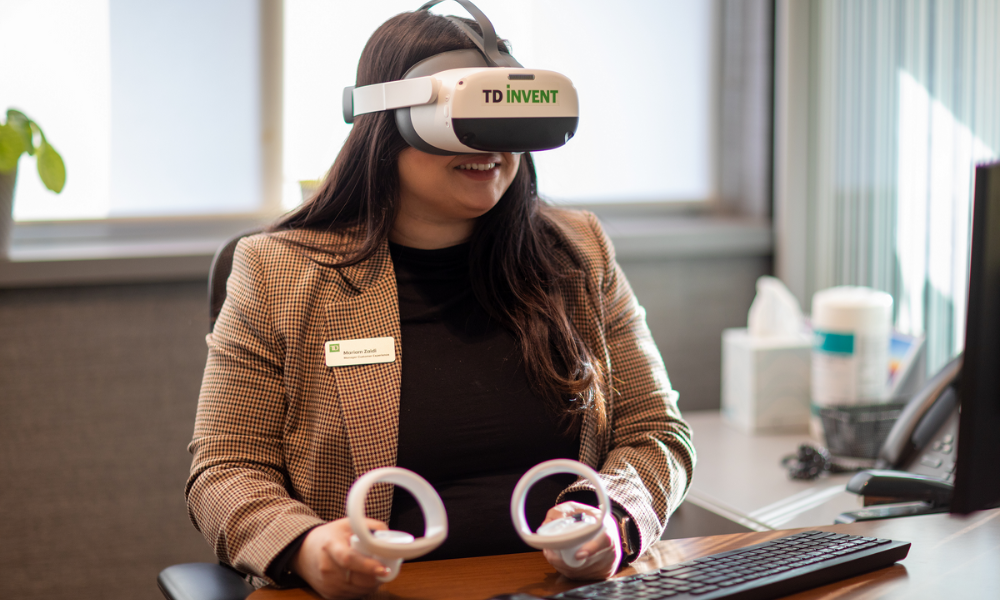'It's one thing to learn about best practices, but it's another to put them into practice from hands-on experience'

The possibilities are endless.
So says Kerry Narduzzi, product manager at TD, in discussing the bank’s new training program using virtual reality or VR to simulate customer interactions and teach employees how to handle certain situations.
“We're doing this test to learn and understand what the results are before we scale it out and think about what it means, broadly, for our colleagues,” she said. “We are working with our HR partners to understand what the best situations are for learning in this environment. Once we’ve completed the pilot, the possibilities for what virtual situations we can create are endless.”
The pilot program has been in effect since November at select branches in Alberta and Ontario and uses a VR headset that transports employees to a virtual TD branch. The VR training modules are designed to replicate real-life scenarios, such as interacting with stressed customers, to help employees develop crucial skills like empathy and problem-solving — all while allowing employees to become more familiar with business practices, she said.
While the program currently has one training module, TD has two additional modules in development that will be rolled out to the trial branches as part of the pilot project, Narduzzi said.
Learning from experience in VR environment
The VR environment provides employees with a safe environment to practice customer interactions in a “free to fail environment,” where they can make mistakes and learn from them. It also allows employees to exercise empathy in a challenging situation, Narduzzi said.
A key aspect to this experience involves the ability for employees to replay their interactions back, switch places with the customer and listen to themselves from a different perspective. Employees can also grade themselves on their interaction and see how closely they followed the instructions and TD’s best practices, she said.
“For most people, learning comes from experience,” Narduzzi said. “It’s one thing to learn about best practices, but it’s another thing to put them into practice from hands-on experience.”
Prior to the option for VR training, TD implemented traditional training practices including online training, roleplaying and shadowing. Branch manager Michelle David often roleplays customer situations with new staff that can now be virtually simulated.
“The VR training provides that safe environment and a different way of learning. We usually use roleplay to simulate some of these interactions, but the virtual reality just has such an authentic feel to it,” David said.
Employee feedback on training program
Eighty per cent of employees in TD’s pilot program reported preferring the VR environment to traditional ways of training. They also reported high levels of information retention and feeling confident after completing the simulation due to its realism, Narduzzi said.
The virtual training has been well received by new and tenured employees alike, said David. Regardless of the generation an employee belongs to, the virtual interface is user-friendly and supported by an ambassador who aids and supports the team.
“The training is a reminder for our tenured colleagues of the conversations that we see on a daily basis. For all employees, it takes us back to our foundation, which is putting the client, our customers, at the core of our interactions,” she said.
The feedback has not only been positive but constructive, with employees sharing their opinions on other areas where they would like to see VR training, Narduzzi said, which “will go into the design process for future phases.”
VR for interns and co-op students
The training simulation is not the first time TD has used VR for their employees. Last year, the company introduced a VR program for interns and co-op students in Canada. This program also started as a pilot, but its success allowed for its continuation, Narduzzi said.
The VR onboarding pilot sparked excitement among students, with TD seeing an approval rate of over 99%, she said.
"Through TD Invent, we're focused on innovation activities and exploring emerging technologies, concepts and business models to future-proof the bank. We're proud to have launched multiple immersive experiences that leverage emerging technologies to engage customers and new colleagues. Outside of our immersive learning experience, we launched a pilot last year for our interns and co-ops to onboard and collaborate at the bank. The feedback was so incredible that we decided to extend the program into 2024 and beyond," said Baanu Ratneswaran, head of enterprise innovation at TD.




